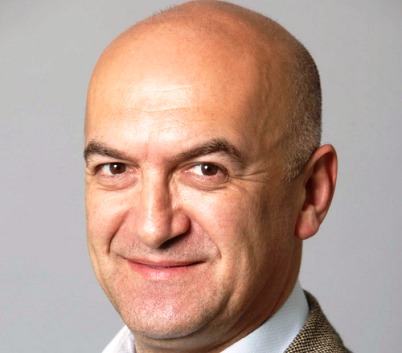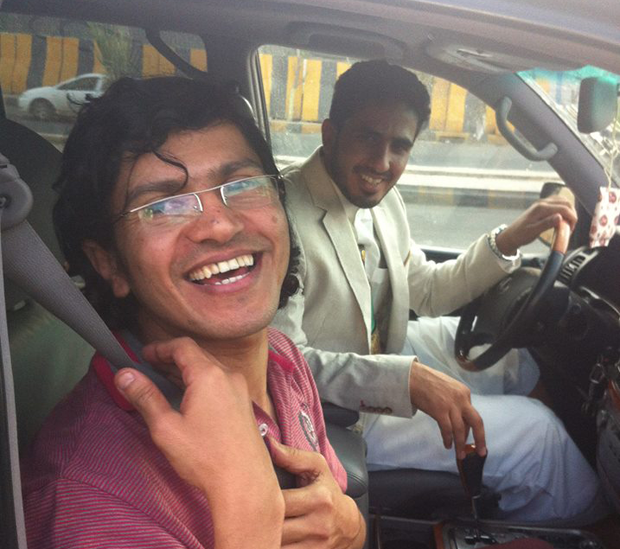24 Jul 2013 | Brazil, Politics and Society
A Brazilian sociologist says he was threatened at gunpoint in Rio de Janeiro last week, after he gave a newspaper interview criticising police action in recent popular demonstrations.
Paulo Baía says he left home around seven o’clock last Friday, 19 July, to take a walk in Flamengo Park, when two armed men wearing balaclavas and sunglasses put him into an unmarked car with tinted windows.
“They told me I should give no more interviews like the one I gave today to Globo and that I shouldn’t say anything else ever again about the Military Police because, if I did, it would be the last interview I would give in my life”, Baía told Globo newspaper.
Globo printed Baía’s interview on the same day he was flash kidnapped. In the article, the sociologist from Rio de Janeiro’s Federal University (UFRJ) analysed groups that acted more violently during demonstrations that happened days before at Leblon, a higher-class area in the south side of Rio. He was critical of police action towards protesters.
“Police saw crimes being committed and did nothing. Police’s message was this: now I’m going to beat everybody up”, he told Globo on the interview.
Baía says he was eventually left at Cinelândia, a public square in Rio, 20 minutes after he was kidnapped. He says guns were not pointed at him, but his kidnappers made them visible the entire time.
The sociologist is wary of alleging that his kidnappers are policemen, as he says that they may be imposters attempting to make a case against the military police.
Later on Friday Baía met Rio State attorney general Marfran Vieira, who said that both the Public Ministry and the Civil Police would check images taken by CCTV cameras at Flamengo Park and Cinelândia.
“This was an attempt to shut down an important voice in the political scene and ends up harming the democratic state based on the rule of law”, said Vieira.
Popular demonstrations that started on early June recently became more violent in Rio, where some protesters have targeted journalists and media outlets, and have also vandalised businesses.
24 Jul 2013 | News, Politics and Society, Turkey

In late June, Baydar, who was reader’s editor at the newspaper, had attempted to use his regular slot in the newspaper to condemn the authorities’ actions during Istanbul’s Gezi Park protests. But the newspaper’s editorial board pulled the column.
Baydar, who took a leave of absence from the newspaper following the decision, went to to write a column in the New York Times headlined In Turkey, Media Bosses Are Undermining Democracy. The column appeared on 19 July. According to Today’s Zaman, Baydar subsequently submitted another column to Sabah, but the article was rejected, and Baydar was fired on 23 July.
In an article for the current edition of Index on Censorship magazine, written before he was fired, Baydar wrote:
In big media outlets, fierce censorship and self-censorship are practised on a daily basis. They are severely crippled in their pursuit of journalism, unable or unwilling to cover corruption and abuse of power or to allow critical voices and dissent to be heard. When it comes to particular topics, such as criticism of the government, corruption or abuse of power, news stories are either filtered or unpublished; direct censorship – the actual blacking out of text – is exercised when material is found to be ‘too sensitive’ for the government’s or newspaper owners’ interests.
You can read the full article for free here
Find out more about Index on Censorship Magazine and subscribe here
24 Jul 2013 | News, Politics and Society, Yemen

A picture of the journalist, smiling broadly as he left the capital’s Political Security Prison, quickly circulated online following his release, having served half of his five-year prison sentence handed down in January 2011.
Shaye’s reprieve was hailed late on Tuesday “as a victory for common values of media freedom, justice and human rights,” in a statement by Yemeni press freedom organisation, Freedom Foundation, which has campaigned for his release.
The first indications of a possible discharge came in May – after more than 2.5 years in solitary confinement – an order was made by President Hadi for Shaye to be released “soon”. But, it was not the first time a Yemeni president had attempted to free him. Days after being sentenced in 2011, Ali Abdullah Saleh – Yemen’s president of 33 years – issued a pardon for his release. However, due to direct intervention by Barak Obama, Shaye remained in jail. As a result his family were very sceptical that this most recent pledge would be fulfilled.
Ten days after reports of Hadi’s order, a note from Shaye was smuggled out of the prison.
“The only person responsible for kidnapping and detaining me is Obama,” read the letter. “I’m eagerly longing to see my mother and family. Still, I have not forgotten my loyal colleagues and friends. Everything you do for my sake makes my solitary confinement tolerable.”
The holy-month of Ramadan is used annually as a period of amnesty and this week local reports suggested Shaye might be released on the 17th day [July 26] of the religious month of daylight fasting. But similarly, the US has previously stepped in to prevent such pardons in Yemen. In 2004, the release of 28 prisoners during Ramadan was blocked because of ‘objections by the US government.’
Shaye’s eventual release appears to have come as the Freedom Foundation suggested “despite all the American pressures on him [President Hadi] to keep Shaye in prison.” In a recent meeting with local journalists US Ambassador to Yemen, Gerald Feierstein reinforced the US government’s position saying: “Shaye should be kept in prison.”
Shaye was arrested in August 2010 following his outspoken criticism of the Yemeni government and his reporting of a cruise missile attack on a suspected al-Qaeda training camp in al-Majala, southern Yemen, in December 2009 that left 55 dead, including 21 children. After visiting the bomb site and collecting evidence, Shaye reported that the killings were caused by cluster munitions and had been carried out by the United States, not the Yemeni government who claimed responsibility at the time.
In 2010 Shaye was found guilty of assisting al-Qaeda by the Special Criminal Court for Security Affairs, a court seen as illegal by international human rights organisations. He refused to recognise the legitimacy of proceedings, turning down legal representation he was given only a few minutes to defend himself. Shaye was later sentenced in January 2011 to five years in prison for his links to al-Qaeda – Shaye had specialised in reporting on the Yemeni off-shoot Al-Qaeda in the Arabian Peninsula. His reporting on the al-Majalah bombing was later – after the conclusion of his trial – corroborated by leaked US diplomatic cables.
The conditions of his release as part of his original sentence will be upheld, according to the state news agency [also Shaye’s former employer] Saba News: He will not be allowed to leave the capital, Sana’a for two years.
24 Jul 2013 | In the News
INDEX EVENTS
NSA, surveillance, free speech and privacy
Edward Snowden’s leaks about the US’s international mass surveillance programmes has prompted perhaps the definitive debate of our age: How free are we online? Can we ever trust technology with our personal details?
25 July, Time 6.30pm, Free, but RSVP required. Space is limited.
Doughty Street Chambers, WC1N
(More information)
BELARUS
Belarus internet infested with spammers
Almost 30% of all net addresses in Belarus are blocked by anti-spam firms because of the amount of junk mail passing through them, says a report.
(BBC)
CANADA
Threats against lesbian couple aren’t a free speech issue. They’re a crime
A lesbian couple in Kingston, Ontario, has been on the receiving end of a couple of appalling, hateful letters, which are also certainly against the law.
(National Post)
CHINA
Chinese censorship will fail to hide Shenhua’s ruthless water grab
A Greenpeace East Asia investigation exposing how a Chinese state-run coal company is overexploiting water resources and illegally discharging toxic wastewater has made global headlines today.
(Greenpeace)
INDIA
India moves toward media regulation
As talk in India turns to media plurality and regulation, attention is turning to murky ownership structures and monopolistic practices. But some see the government’s moves as attempts to muzzle the press.
(Index on Censorship)
CJI criticises media excesses, but bats for ‘self-regulation’
Less than a week after taking over as head of the apex judiciary, Chief Justice of India P. Sathasivam plunged straight into key debates on the changing nature of the Indian media and the policy framework that should govern it. In a speech here on Tuesday, the CJI, while praising the media, also pointed to its excesses but favoured ‘self-regulation.’
(The Hindu)
RUSSIA
What Russia blocked in May
The Russian authorities came out with two new categories of website to be banned in May: on manufacturing explosive devices and bribery. If the first is the reaction of the authorities to the Boston bombings, the latter reflects major social problems of the society in Russia.
(Index on Censorship)
TUNISIA
Tunisia PM: Tamarod is danger to democratic process
Tunisia’s Tamarod movement, which has called for the dissolution of the National Constituent Assembly, is endangering the country’s democratic process, Islamist Prime Minister Ali Larayedh said on Monday.
(Middle East Online)
TURKEY
Turkey’s main opposition leader lambastes PM over media freedom
Turkey’s main opposition leader accused Prime Minister Tayyip Erdogan on Tuesday of cowing local media into self-censorship after a journalist group said dozens of reporters were fired for their coverage of anti-government protests.
(Reuters)
UNITED KINGDOM
David Cameron’s online porn ban unravels amid debate over internet censorship
David Cameron is facing serious questions over how his plan for automatic internet “porn filters” in every British home would work – after he suggested that topless images such as those used on the Sun’s page three would be still be accessible online.
(Belfast Telegraph)
Author Marcus Hearn reveals censorship issues in his book The Bamforth Collection: Saucy Postcards
They have delighted millions in Britain’s seaside resorts over the years. But the cheeky cartoon postcards produced in Holmfirth also fell foul of the censorship laws. So much so that no less a figure than author George Orwell was involved in a campaign against them.
(The Huddersfield Daily Examiner)
UNITED STATES
East Bay commission tries to quell ‘hate speech’ directed at gays
Prompted by a series of controversies and ugly episodes at City Council meetings swirling around the local gay community and its critics, the city’s Human Rights and Human Relations Commission explored the line between free speech and hate speech late Monday.
(Mercury News)
#RushforSubway: Citizens show support for Limbaugh, free speech, and sandwiches
Mmm, freedom. Tastes like … sandwiches! While bitter #StopRush bullies and their doofus pals freak out over Subway having the gall to advertise on Rush Limbaugh’s radio show, hungry Dittoheads and free speech proponents are rushing out to show their support for the sandwich purveyor
(Twitchy)
Banned from campus over ‘Hot for Teacher’ essay, college student loses free speech suit
A federal judge in Michigan has dismissed a free-speech suit filed by an Oakland University student who was banned from campus for several semesters after writing an essay about his attraction to his creative writing instructor.
(ABA Journal)
Previous Free Expression in the News posts
July 23 | July 22 | July 19 | July 18 | July 17 | July 16 | July 15 | July 12 | July 11 | July 10 | July 9 | July 8 | July 5


